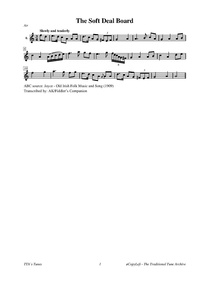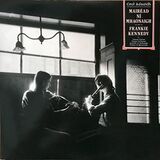Template:Pagina principale/Vetrina: Difference between revisions
No edit summary |
No edit summary |
||
| Line 1: | Line 1: | ||
{{SheetMusic | {{SheetMusic | ||
|f_track= | |f_track=An Clár Bog Déil.mp3 | ||
|f_pdf= | |f_pdf=The Soft Deal Board.pdf | ||
|f_artwork= | |f_artwork=Frankie Kennedy2.jpg | ||
|f_tune_name= | |f_tune_name=The Soft Deal Board | ||
|f_track_title= | |f_track_title=Soft_Deal_Board_(The) | ||
|f_section=abc | |f_section=abc | ||
|f_played_by=[https:// | |f_played_by=[https://www.discogs.com/release/4636596-Mairéad-Ní-Mhaonaigh-Frankie-Kennedy-Ceol-Aduaidh Mairéad-Ní-Mhaonaigh-Frankie-Kennedy] | ||
|f_notes= | |f_notes=Mairead Ni Mhaonaigh and Frankie Kennedy in 1983. | ||
|f_caption= | |f_caption=Another song to the same air, which held as high a place in popular estimation, was one composed by a well known Gaelic poet, the Rev. William English, beginning with "Cois na Brighde, seal do bhiossa, go sugach samh" (While I dwelt by the (river) Bride, pleasantly and tranquilly). | ||
|f_source=[https:// | |f_source=[https://open.spotify.com/track/3bRta3qCEVtqL81ne6GwSO?si=a35362fc739c4c89 Spotify] | ||
|f_pix=420 | |f_pix=420 | ||
|f_picpix=200 | |f_picpix=200 | ||
|f_article=[[ | |f_article=[[Soft_Deal_Board_(The) | '''The Soft Deal Board''']] | ||
The | The original Irish song of Clar bog del, better known in Munster by the name of Caiseal mhumhan, will be found in Edward Walsh's Irish Popular Songs, p. 168. It was a universal favourite sixty or seventy years ago. Another song to the same air, which held as high a place in popular estimation, was one composed by a well known Gaelic poet, the Rev. William English, beginning with 'Cois na Brighde, seal do bhiossa, go sugach samh' 'While I dwelt by the (river) Bride, pleasantly and tranquilly.' This will be found in O'Daly's Poets and Poetry of Munster, second series, p. 120. | ||
I once heard 'Cashel of Munster' sung under peculiarly pleasant and characteristic circumstances, when I was a mere child. The people of the village had turned out on a sunny day in June to 'foot' the half dry turf in the bog at the back of Seefin mountain which rises straight over Glenosheen: always a joyuous occasion for us children. Dinner time came about 1 o'clock: each family spread the white cloth on a chosen spot on the dry clean bog surface. | |||
There might have been half a dozen groups in that part of the bog, all near each other, and all sat down to dinner at the same time: glorious smoking hot floury savoury potatoes, salt herrings (hot like the potatoes), and good wholesome blathach, i.e. skimmed thick milk slightly and pleasantly sour a dinner fit for a hungry king. | |||
After dinner there was always a short interval for rest and diversion generally rough joyous romping. On this occasion the people, with one accord, asken Peggy Moynahan to sing them a song. Peggy was a splendid girl, noted for her singing: and down she sat willingly on a turf bank. | |||
In a moment the people clustered round; all play and noise and conversation ceased; and she gave us the Clar bog del in Irish with intense passion, while the people old and young, including myself and my little brother Robert sat and listened, mute and spellbound. I have good reason to fear that the taste for intellectual and refined amusements singing, music, dancing, story telling, small informal literary clubs and meetings, etc. once so prevalent among the people of my native district, which often expressed itself in scenes such as I describe here, is all gone; and we shall never witness the like again. Is muar an truagh e: more's the pity!" (Joyce) | |||
}} | }} | ||
Revision as of 16:27, 11 May 2024

Played by: Mairéad-Ní-Mhaonaigh-Frankie-Kennedy
Source: Spotify
Image: Mairead Ni Mhaonaigh and Frankie Kennedy in 1983.

The original Irish song of Clar bog del, better known in Munster by the name of Caiseal mhumhan, will be found in Edward Walsh's Irish Popular Songs, p. 168. It was a universal favourite sixty or seventy years ago. Another song to the same air, which held as high a place in popular estimation, was one composed by a well known Gaelic poet, the Rev. William English, beginning with 'Cois na Brighde, seal do bhiossa, go sugach samh' 'While I dwelt by the (river) Bride, pleasantly and tranquilly.' This will be found in O'Daly's Poets and Poetry of Munster, second series, p. 120.
I once heard 'Cashel of Munster' sung under peculiarly pleasant and characteristic circumstances, when I was a mere child. The people of the village had turned out on a sunny day in June to 'foot' the half dry turf in the bog at the back of Seefin mountain which rises straight over Glenosheen: always a joyuous occasion for us children. Dinner time came about 1 o'clock: each family spread the white cloth on a chosen spot on the dry clean bog surface.
There might have been half a dozen groups in that part of the bog, all near each other, and all sat down to dinner at the same time: glorious smoking hot floury savoury potatoes, salt herrings (hot like the potatoes), and good wholesome blathach, i.e. skimmed thick milk slightly and pleasantly sour a dinner fit for a hungry king.
After dinner there was always a short interval for rest and diversion generally rough joyous romping. On this occasion the people, with one accord, asken Peggy Moynahan to sing them a song. Peggy was a splendid girl, noted for her singing: and down she sat willingly on a turf bank.
In a moment the people clustered round; all play and noise and conversation ceased; and she gave us the Clar bog del in Irish with intense passion, while the people old and young, including myself and my little brother Robert sat and listened, mute and spellbound. I have good reason to fear that the taste for intellectual and refined amusements singing, music, dancing, story telling, small informal literary clubs and meetings, etc. once so prevalent among the people of my native district, which often expressed itself in scenes such as I describe here, is all gone; and we shall never witness the like again. Is muar an truagh e: more's the pity!" (Joyce)
...more at: The Soft Deal Board - full Score(s) and Annotations
X:0 T:The Soft Deal Board M:3/4 L:1/8 R:Air S:Joyce – Old Irish Folk Music and Song (1909) Z:AK/Fiddler’s Companion Q:"Slowly and tenderly" K:A Minor V:1 clef=treble name="0." [V:1] fd|e>d cA AA|d>c AG (3^FEF|G4 A2|A3B cA|G2A2 AB| c2A2 (A/B/c/d/e/)|f3a gf|e3g (6f/d/c/A/G/^F/|G2A2 AB|c2A2 de| f4g2|a3g fg|e>d cA {G}AA|d>c AG (3^FEF| G4 A2|A4||
